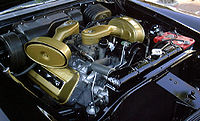
Photo from wikipedia
Abstract Continuous variable valve lift is an effective technology to achieve the unthrottled load control on gasoline engines. However, the technology also introduces some new problems which limit the further… Click to show full abstract
Abstract Continuous variable valve lift is an effective technology to achieve the unthrottled load control on gasoline engines. However, the technology also introduces some new problems which limit the further improvement of engine performance. In this study, a gasoline engine is modified to be an unthrottled engine by removing the throttle and replacing the conventional valvetrain with an innovative continuous variable valvetrain. Based on the engine, the benefits and drawbacks of the unthrottled operation with early intake valve closure strategy are experimentally and numerically investigated at low load. The results indicate that the unthrottled load control with the strategy can improve the gross mechanical efficiency, but the gross indicated thermal efficiency decreases due to poor combustion. Specifically, a 9.8% improvement in fuel efficiency of the test engine is achieved at a brake mean effective pressure of 100 kPa and 2000 r/min. By comparison, the inefficient combustion under the early intake valve closure is mainly caused by the weak turbulence and low gas temperature at the spark timing, which need to be moderately enhanced to further improve engine performance. All these conclusions could provide a significant reference for the development of more efficient engines.
Journal Title: Applied Energy
Year Published: 2020
Link to full text (if available)
Share on Social Media: Sign Up to like & get
recommendations!